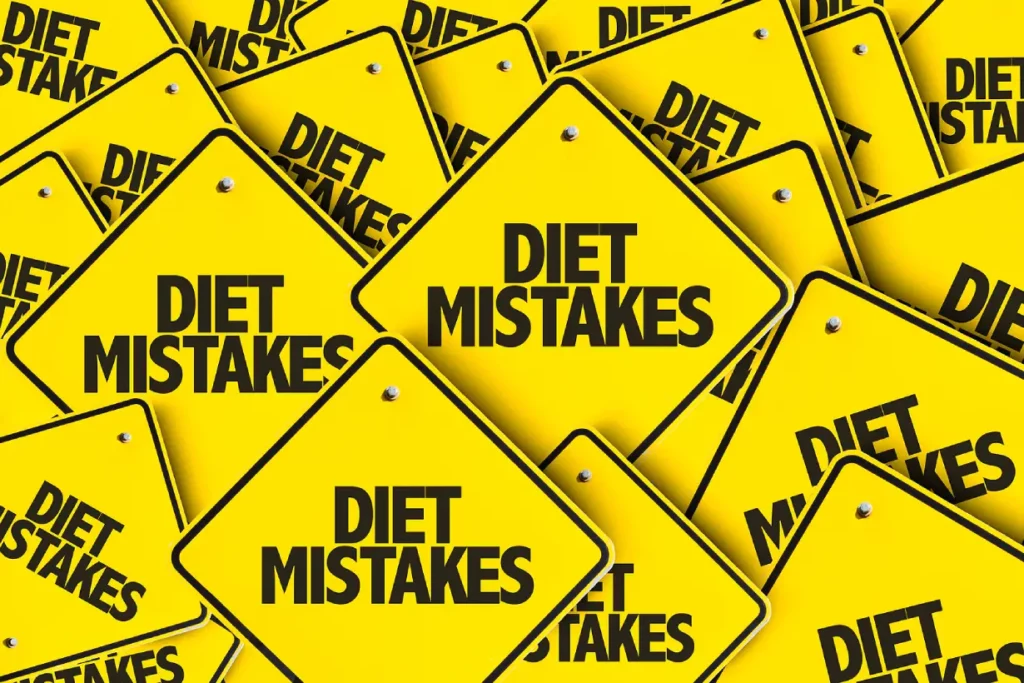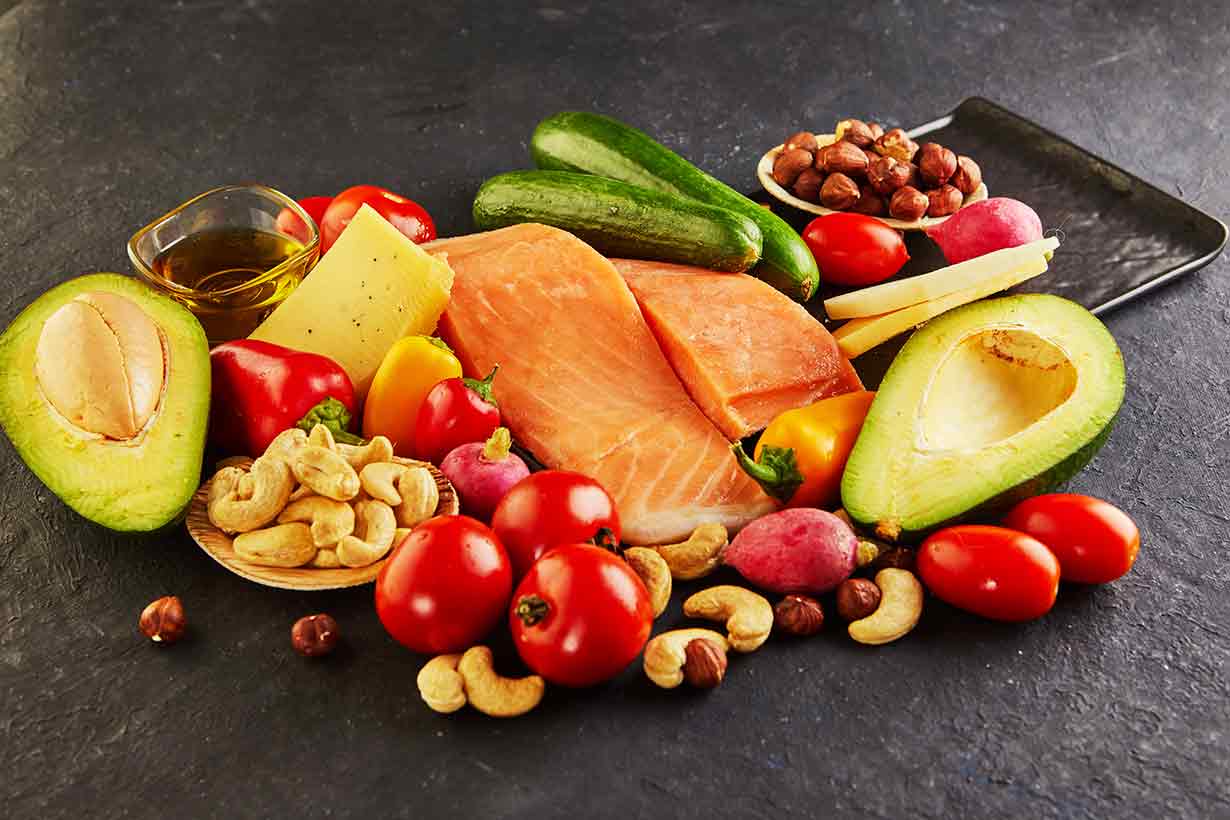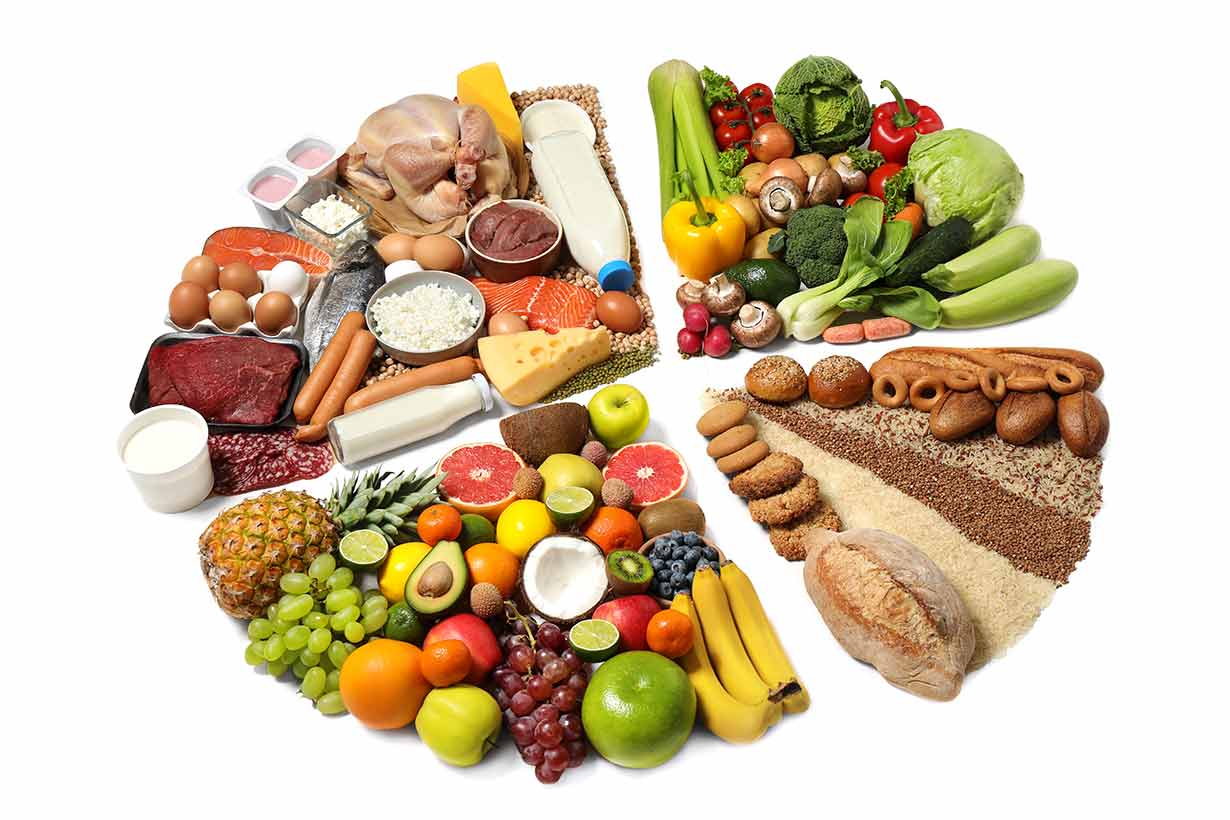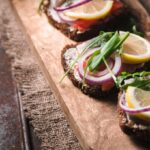The New Year marks a time when many people decide to start a new diet.
However, several common mistakes often hinder success for those beginning a diet at this time of year.
This article examines five common diet mistakes and offers guidance on how to avoid them, including suggestions for better alternatives.
Table of contents

1) Not Consuming Enough Protein
One of the most common diet mistakes is following a plan that is far too restrictive. These diets are often very low in calories, making it difficult to consume enough protein.
The problem with low-calorie, low-protein diets is that they can promote the loss of lean muscle mass (1, 2).
This can occur for several reasons, including :
- Muscle breakdown for energy needs: During periods of energy restriction, the body may begin breaking muscle down to use as an energy source.
- Muscle breakdown for amino acids: Amino acids are building blocks for various processes in the body. When protein intake is insufficient and amino acid availability is low, the body may break down muscle to gain more amino acids.
- Reduced rates of muscle protein synthesis: Muscular breakdown happens every day, which is why an adequate protein intake is necessary for muscle maintenance and growth. When protein intake is insufficient, there are not enough amino acids to repair and maintain muscle at an adequate rate, resulting in a net loss of lean muscle mass.
As a result, rather than seeing notable improvements in body composition, individuals may lose large amounts of muscle along with fat.
The scientific research on this topic supports the drawbacks of diets lacking adequate protein.
For example, a systematic review and meta-analysis of 20 randomized controlled trials found that participants following higher-protein diets retained more muscle and lost more fat (3). In this context, “higher protein diets” were defined as those where protein contributed more than 25% of total energy intake.
It is also worth remembering that muscle is metabolically active and requires more energy than fat. In other words, losing muscle mass lowers energy requirements, making it harder to lose weight.
Key point: Very low-protein diets increase the risk of losing lean muscle mass.
2) Focusing Only On Calories and Neglecting Food Quality
Regardless of what you may have heard, the number of calories you consume is vital for weight regulation.
While counting calories isn’t strictly necessary for weight loss, maintaining a consistent energy deficit is essential. This means consuming fewer calories than we expend through metabolism and physical activity (4, 5).
In the short-term, it is clear that calorie deficits–regardless of food quality–can result in weight loss.
However, focusing only on calories while ignoring food quality can hinder long-term dietary success. It’s not just about how much we eat–what we consume also plays a significant role.
For example, it’s possible to lose weight eating any type of food if it’s in small enough quantities, whether it’s fast food, candy, or anything else. However, these foods tend to have a much smaller satiating effect. In simpler terms, hunger tends to return quicker after consuming them when compared to higher-quality food choices.
For example, many people may be able to eat 1000-2000 calories in a single sitting at a fast food chain and still feel hungry a few hours later.
In contrast, consuming the same number of calories from a plate full of whole foods–such as fish, boiled potatoes, and vegetables–would prove very challenging. Furthermore, such a meal would also leave you feeling more satiated.
Satiating Foods
Satiety refers to the feeling of fullness and satisfaction that reduces the desire for further food until the next meal. In this context, higher-satiety foods can help to lower snacking between meals and overall energy intake (6).
To learn more about the most satiating foods, see here: What Is the Satiety Index of Common Foods?
Typically, whole, minimally processed foods such as fish, eggs, potatoes, oats, legumes, fruit, and meat provide the highest satiety (7, 8).
These foods help you feel fuller for longer, lowering the likelihood of food cravings and eating additional food shortly after a meal.
Scientific research on this topic has demonstrated that:
- People tend to consume fewer calories when opting for whole foods over ultra-processed ones (9).
- Factors like protein content, fiber, and food volume appear to have a positive impact on satiety (10, 11, 12).
Key point: While total calorie intake is pivotal for weight loss, the quality of food is equally important. High-quality, whole foods rich in protein and fiber can make it easier to eat less without experiencing hunger. On the other hand, a diet that leaves you constantly hungry is unlikely to be sustainable.
3) Ignoring Calories (and Consuming Too Many “Hidden Calories”)
As emphasized in the previous point, following a sustainable diet that minimizes excessive hunger largely relies on food quality.
However, this doesn’t mean that calories are irrelevant–they still matter, and significantly so.
Even the healthiest diet in the world will lead to weight gain if we consume more food than our energy needs require.
Consider these common real-world scenarios:
Weekend Eating Patterns
A well-formulated, healthy weekday diet with a calorie deficit aimed at gradual weight loss can be undone by weekend eating habits.
For instance, consuming a large pizza along with several beers on the weekend could swiftly offset any weight loss achieved during the week.
Scientific evidence supports this example as a common dietary mistake:
- A dietary analysis involving 1421 participants found weekly fluctuations in weight of a mean 0.35%, with weight loss occurring during weekdays followed by weight gain during weekends (13).
- In a large cohort study tracking 7007 adults for at least five months, researchers observed that women who consumed 50 to 250 calories more on weekend days than on Mondays experienced significantly more weight loss (1.64%) than those who consumed over 500 additional calories on weekend days. Consistently maintaining calorie intake on weekends was associated with better weight loss outcomes (14).
- A year-long randomized controlled trial involving 48 healthy adults compared calorie restriction to daily exercise. The study revealed that participants gained weight on weekends at baseline but not on weekdays. While all participants lost weight during the weekdays, weight loss stalled on weekends due to higher caloric intake in both groups (15).
Failing To Account For Hidden Calories
Failing to account for “hidden calories” can also be a problematic diet mistake.
In this context, an individual might follow a relatively healthy diet, with well-formulated meals for breakfast, lunch, and dinner that support their weight loss goals. However, the consumption of unaccounted-for calories throughout the day could undermine these efforts.
Examples of hidden calories might include:
- A small 150-calorie snack after lunch
- An extra 150 calories from vegetable oil used for cooking
- A 200-calorie latte from a coffee shop
If someone aiming for a 2200-calorie daily intake consumed 1900 calories from their meals, these “hidden calories” could push their intake over their target, leading to weight gain.
Tracking dietary and caloric intake can help in avoiding such issues.
For those who prefer not to meticulously track their calorie intake, developing an awareness of one’s habitual diet can still help foster better control of caloric intake.
Key point: It isn’t necessary to strictly track calories, but it is important to have a general idea of your dietary intake throughout the week.
4) Ignoring Liquid Calories
It’s possible to have the best meal plan in the world, but it won’t result in weight loss if excessive calories are consumed through drinks.
Many people may not realize just how many calories certain drinks contain.
For example:
- A typical 12-fl oz (360 ml) bottle of beer contains approximately 150 calories (16).
- A 16.9 fl oz (500 ml) bottle of sugar-sweetened cola can have over 200 calories (17).
- Getting a sweetened coffee drink from Starbucks could contain over 400 calories, depending on the size and specific drink (18).
As these examples show, failing to take “liquid calories” in the diet into account can significantly hinder weight loss efforts.
Moreover, research indicates that liquid calories don’t lead to the same satiety responses seen with solid food options (19, 20, 21).
Key point: The calories we consume in drinks are just as important for weight management as those in the foods we eat.
5) Following a Short-Term Diet Without Longer-Term Planning
Losing weight is possible with various diets, provided they can be sustained for an adequate period (22).
Whether it’s a celebrity-endorsed diet, plant-based, carnivore, low-carb, Nordic, or any other approach, any regimen that reduces overall energy intake sufficiently will result in weight loss.
However, a common diet mistake is following a specific diet for a set duration to achieve weight loss without adequate post-diet planning.
The problem with short-term diets:
Consider this typical scenario:
- An individual gains weight and decides to start a diet. Despite anticipating challenges, they commit to the diet and experience weight loss, even though they don’t enjoy following it. Motivated by visible results, they stick with the diet through the 6-week regimen.
- After completing the diet, they are pleased with their weight loss but glad to “finish” the diet and return to their previous eating habits.
- Unfortunately, as their post-diet dietary pattern mirrors the diet that caused their initial weight gain, their weight starts to creep up again.
- The cycle repeats.
The Key Lies in a Long-Term, Sustainable Eating Approach
It’s crucial to recognize that while short-term diets can lead to initial weight loss and offer health benefits, they should ideally be followed by a well-planned eating plan to prevent weight regain.
Despite common promises of “quick fixes,” there is no easy solution. The key is to gain sufficient knowledge to formulate a healthy, sustainable diet that is enjoyable and fits into your lifestyle.
In this regard, we all have different personal situations and preferences, so what works for one person may not be the right fit for another.
For those wondering where to start, helpful resources could include useful nutrition books. A more personalized option would be to consult with a registered dietitian or nutritionist who understands your individual needs.
Additionally, here are some nutrition-related products that can make home-cooking a bit easier.
Key point: Short-term diets may result in initial weight loss but are often unsustainable. Sustained weight loss requires adopting an enjoyable and practical way of eating that can be maintained over time.
Summary
At the start of the year, it is natural for many diets to attract attention with promises of quick results.
However, it’s crucial to choose a diet that you enjoy and can integrate into your lifestyle in an ongoing manner. Such diets lead to long-term success rather than short-lived results.
Additionally, effective diets should take both food quality and overall energy intake into account. Generally, it’s harder to overeat whole foods compared to ultra-processed products.
For further guidance on practical weight management strategies, see here:
How to Lose Weight (Without Tracking Calories): 15 Useful Tips





